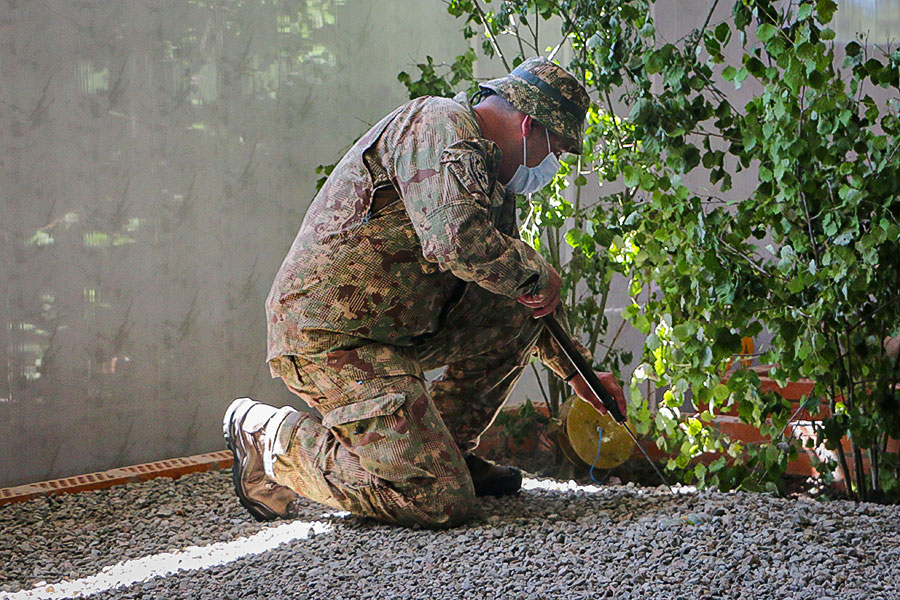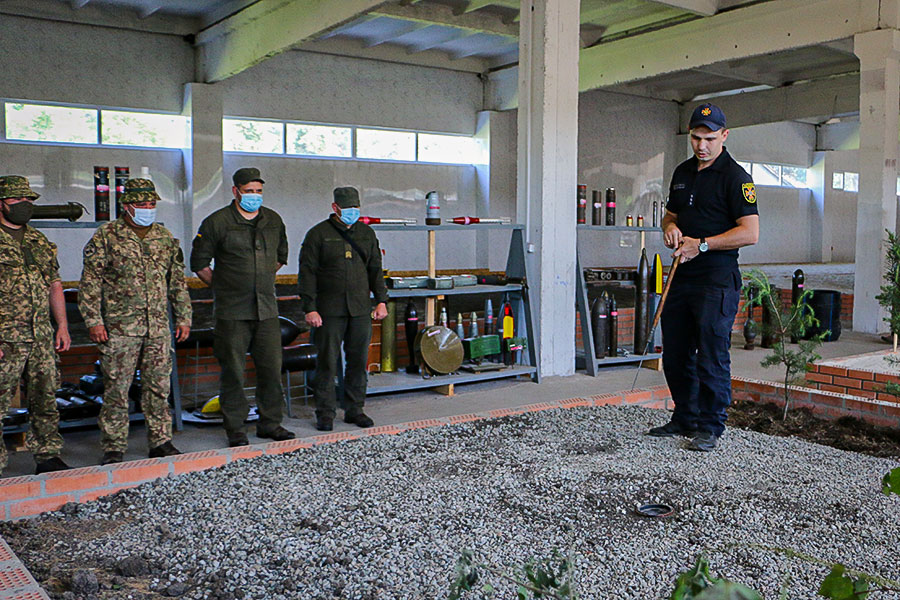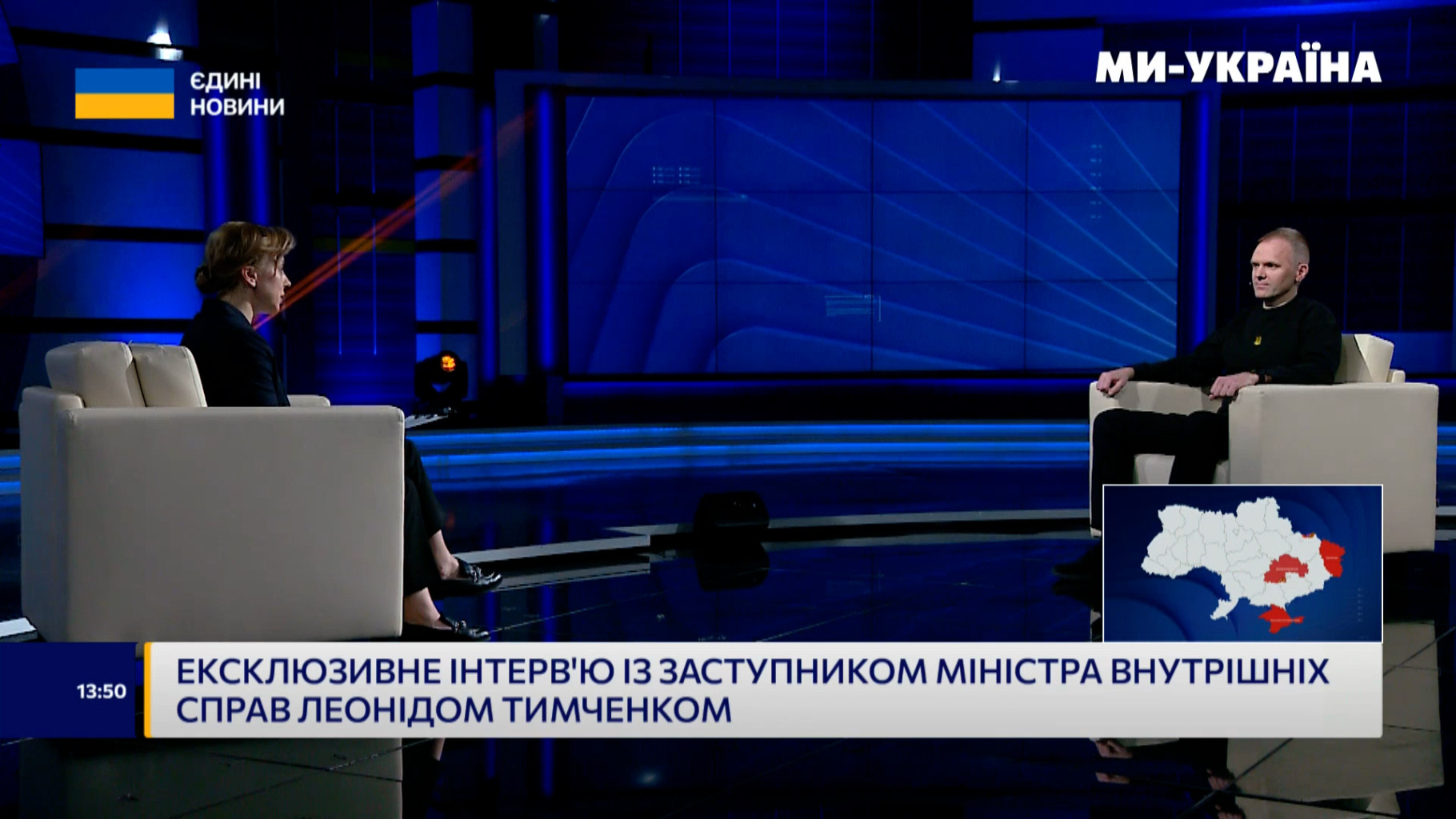Guardsmen take on NATO's experience in humanitarian demining

The guards took part in training on counteracting improvised explosive devices on the basis of the Interregional Center for Humanitarian Demining and Rapid Response of the State Emergency Service of Ukraine, located in Merefa. The training covered more than three dozen trainees from the National Guard, the State Emergency Service of Ukraine. situations, the State Border Service of Ukraine and the National Police.
Classes were conducted by British instructors — specialists in counterinsurgency issues, who gained experience in Iraq, Afghanistan and Northern Ireland.
Belted in green grass, not considering the swamp under your feet or, conversely, on a sand-covered dirt road, along trenches and buildings, engineers of various departments and departments comb the area in search of homemade explosive devices. All this takes place under the guidance of the stocky, fast and extremely attentive instructor Joel Snarr. He constantly and extremely emotionally repeats that the success of the terrorist who laid the explosives or set a trap on the sapper is directly proportional to the degree of laziness or fatigue of the engineer. After all, any empty bottle, piece of foil or supposedly accidentally forgotten fishing line can lead to a deadly detonation of the embedded charge.

“I worked as part of the coalition forces in Afghanistan. And that's where I acquired those basic skills that I'm imparting here today. They are tested by experience. One day, coalition forces were ambushed. It was a very complex scenario with the use of different types of improvised explosive devices and the constant threat of small arms fire,” said instructor Robert Nicholas. He also added that he has Polish citizenship and is therefore proud of the opportunity to conduct classes in Ukraine and help Ukrainians save lives. The course runs from June 14 to June 25.
“The course is designed to train instructors who will later have a teaching internship with us and will subsequently conduct these classes in their units. Preparation involves 10 key topics. These topics are devoted to conducting searches in buildings, detecting mine-explosive devices, conducting searches in open areas or in places where all kinds of obstacles slow down movement, as well as increasing the ability to counter improvised explosive devices,” said the instructor on counteracting improvised explosive devices, Dzhi Joel Snarr.

The group's senior instructor, Sean Powell, insists that the course focuses on humanitarian demining issues. The task of the students is to learn the techniques of the safest possible study of the potentially mined area and to record the presence of ammunition, combat elements and explosives with which explosives equipment should work.
“The NATO Support and Supply Agency (NSPA) asked us to conduct such a course with a humanitarian approach, namely, how to counter mine and explosive threats by making personnel as safe as possible. We teach how to safely inspect complex areas of terrain, buildings, as well as how to detect explosive objects from the Second World War,” said Sean Powell, senior instructor of the group. Such a fundamental separation of the sapper's protocol into the areas of search and explosives activity is a bit unusual for a ranger. people who are used to working universally.
But the allies insist: narrow specialization has its advantages, in particular, in terms of personnel security.
“We have learned a lot of new information about countering improvised explosive devices in Afghanistan, Iraq. However, the example of Northern Ireland is much closer to us, because the situation there is similar to what is happening in the Donbas. Both there and there, militants widely use modern standard ammunition, the latest means of impulse, they more inventively make traps. They need our experience to improve the safety of their people,” said Volodymyr Sorokin, Head of the Training Department of the Engineering Service of the Training and Combat Training Center for Special Actions of the International Interdepartmental Multidisciplinary Center for Training Units of NGU. He also noted that it is extremely interesting for our specialists to know not only how British sappers solve the problems of terrorists in matters of life and death, but also how the instructors of the United Kingdom evaluate the activities of Ukrainians in this area.
Department of Information and Communication of the Eastern TU of NGU






